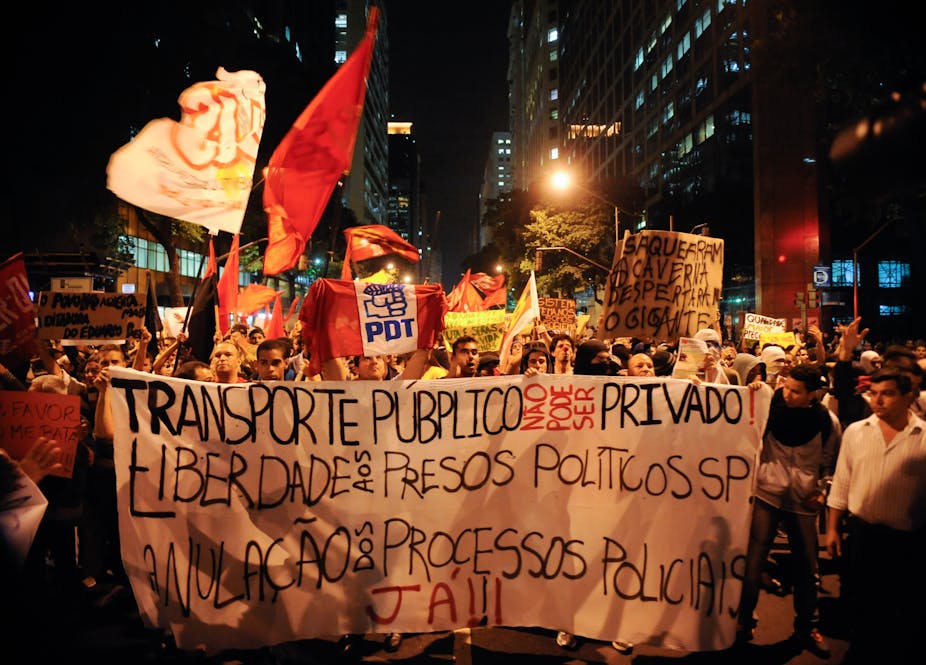Brazilian authorities have tried to put a stop to the demonstrations sweeping the nation by reversing bus fare increases. But it is too late. The protests are now about much more than buses; they are about ensuring Brazilians have the right to come and go as they please, without fear of state violence.
More than a million people took to the streets across the country on Thursday night to defend these rights. And it was widely reported that violence flared. Simultaneous demonstrations took place in at least 80 cities.
State violence against social movements has been woefully common in Brazil recently. A new wave of social protests, organised by young people in the country’s most important cities, have been the target of brutal violence by the military police.
Demonstrators and the press were the targets of police violence. Images show in detail scenes of aggression against unarmed citizens shouting “no violence”, tear gas and rubber bullets being fired directly into groups of reporters and photographers carrying cameras and press badges.
One of the victims was a journalist of the newspaper Folha de S Paulo, Giuliana Vallone, who was injured in the eye by one of the rubber bullets used by police. Seven other members of the press were injured during the event. The military police gave a clear demonstration that they came not to control the outbreak and ensure the safety of everyone, but to bring it to an end.
The truculent approach of the state led to a severe change of the national public opinion in favour of these protests. Before last Thursday the media labelled the wave of protests as “acts of vandalism” perpetrated by “rebels without a cause”. The tone of the press changed, however, after the clear change in the equilibrium of social forces. One major polling agency reports that since last week’s conflicts well over half of São Paulo’s population now support the protests.
The Confederations Cup, currently being played in Brazil, has highlighted another reason for discontent. The cup, an eight-team football tournament featuring some of the world’s top international sides, is seen as a “trial run” for Brazil’s World Cup next year. But many in the country feel the money spent on stadiums and infrastructure for the tournament should have been invested in education or health, and military police have been deployed against protesters at five different Confederations Cup venues.
Whether about football or bus fares, the scale of the last week’s protests has been extraordinary. More than 200,000 took to the streets of the country. These protests have been organised through social media websites like Facebook, as is characteristic of similar contemporary movements elsewhere.
In Brasilia, protesters stormed the National Congress building where the Senate and House of Representatives gather. This happened only once before, in 1984, when the movement “Direct Elections Now” - Diretas Já - freed the country from more than 20 years of military dictatorship.
In Rio de Janeiro, more than 100,000 people marched earlier this week. The Legislative Assembly was attacked, journalists and party flags were expelled, and police officers were assaulted. Some of them even had to be escorted to safety by other protesters, when they became trapped inside bank branches and were unable to leave.
Police violence has also been on the increase, beyond the usual repression of the needy population. An operation conducted by the military police in March, with explicit support from the national media, highlighted the problem.
Dozens of native Brazilian “indígenas” had occupied a listed building next to the famous Maracana stadium since 2006. However, the government intended to build a parking lot next to the stadium in order to provide infrastructure for the World Cup. The occupiers were evicted, after the police used pepper spray, tear gas, electric shock and rubber bullets against them. Protesters, who tried to demonstrate peacefully, were also suppressed, as were some reporters. Some state legislators were amongst the protesters trying to mediate the eviction.
It seems the world is at last waking up to the scale of the problem in Brazil. Last year, the UN Human Rights Council called for the termination of the military police. Earlier this week, the UN asked the government to “guarantee the right to peaceful assembly and to prevent the disproportionate use of force during protests”.
After more than two decades of a brutal military dictatorship, a democratic regime was consolidated in this corner of the world. What this social movement has done, in just over a week, is imposed the opinion that the right to protest must be respected. It has made government and the media retreat from their position of condemning dissent.
But the authorities have given enormous powers to the military police, one of the most violent and corrupt Brazilian institutions. The institution charged with containing dissent is one of the most significant continuities from the former dictatorial regime.
Perhaps therein lies the greatest danger that repression of protests represents for the recent Brazilian democracy. The protesters have won the bus fares battle, but the war for Brazil’s future goes on.

